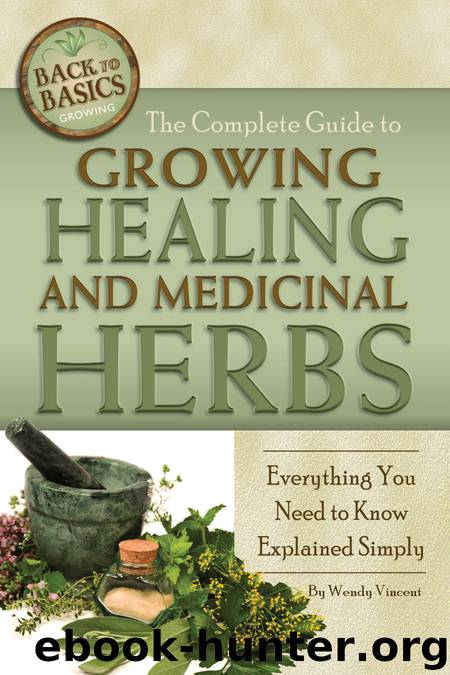The Complete Guide to Growing Healing and Medicinal Herbs by Wendy Vincent

Author:Wendy Vincent
Language: eng
Format: epub
Tags: healing, herbs, relieving, growing, harvest, treatment, ailments, garden
Publisher: Atlantic Publishing Group Inc.
Published: 2012-03-06T16:00:00+00:00
Composting
Composting is the process of recycling decaying, organic matter into another material that will improve soil structure and provide nutrients for plants. When a plant dies, microorganisms and insects attack the remains. These organisms help recycle the plant remains into humus. Humus refers to organic matter that reaches a point of stability where it has broken down as far as it can. Humus is a very nutrient-rich soil builder. Compost is used to speed up the breakdown of organic materials. Composting allows you to return nutrients to the soil, which will help your soil retain moisture longer. Compost is also a natural fertilizer that recycles grass and garden clippings, twigs, leaves, and kitchen scraps into a usable medium that gives back nutrient-rich organic matter to benefit your garden. In addition, composting your garden is an inexpensive method of improving soil.
Compost can range from a highly managed endeavor to simply allowing your compost heap to sit and decay on its own. How you compost will be determined by the amount of time you want to spend on the task, as well as how much compost you would like to use each season. Space and neighborhood restrictions might also be a factor. For the least amount of time and effort on your part, you might want to simply collect organic material in a freestanding pile. This method will take a long time to decompose, perhaps even a year or two before the material is usable in your garden. If you would like the “pile” to appear more attractive in your yard, you may want to enclose it on three sides with fencing wire or even concrete blocks. Add grass clippings, leaves, and kitchen scraps to the pile regularly. If you add kitchen scraps, be sure to cover them with leaves or grass clippings to deter pests and animals. Also avoid adding meat or dairy scraps to your compost as they will smell rotten and attract animals. The size of the pile will shrink as the material breaks down. In about a year, you will have finished compost at the bottom of the pile that you can move and work into your garden beds.
You can also create a pit-style compost area by digging a hole 2 to 3 feet deep. If you choose to use a hole, toss all your compost materials into the pit, and when the it is full, cover it with soil and allow the materials to decompose. The decomposition process cold take up to a year. Once the materials are decomposed, they can be added to your garden. If this method of composting is not fast enough for you, you may want to consider taking a more active role in creating your compost pile.
A more active involvement in the composting process requires more time and energy on your part. The more time you put into your compost pile, the faster it will turn into usable material for your herb garden. When planning your compost area, choose a location in your yard that is level and offers good drainage.
Download
This site does not store any files on its server. We only index and link to content provided by other sites. Please contact the content providers to delete copyright contents if any and email us, we'll remove relevant links or contents immediately.
Turbulence by E. J. Noyes(8014)
The Thirst by Nesbo Jo(6921)
Gerald's Game by Stephen King(4636)
Be in a Treehouse by Pete Nelson(4029)
Marijuana Grower's Handbook by Ed Rosenthal(3668)
The Sprouting Book by Ann Wigmore(3582)
The Red Files by Lee Winter(3411)
The Remains of the Day by Kazuo Ishiguro(3388)
Sharp Objects: A Novel by Gillian Flynn(3003)
Organic Mushroom Farming and Mycoremediation by Tradd Cotter(2684)
Christian (The Protectors Book 1) by L. Ann Marie(2678)
The Culinary Herbal by Susan Belsinger(2470)
Stone Building by Kevin Gardner(2386)
The Starter Garden Handbook by Alice Mary Alvrez(2329)
Lilac Girls by Martha Hall Kelly(2288)
The Unlikely Pilgrimage of Harold Fry by Rachel Joyce(2260)
The Lean Farm Guide to Growing Vegetables: More In-Depth Lean Techniques for Efficient Organic Production by Ben Hartman(2123)
Urban Farming by Thomas Fox(2099)
Backyard Woodland by Josh VanBrakle(1922)
